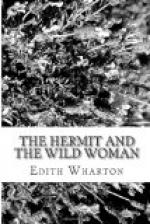And then—without her having had the courage to ask if the girl in the punt were also Gwendolen Matcher—they passed on to photographs of his rooms at Oxford, of a cousin’s studio in London—one of Lord Askern’s grandsons was “artistic”—of the rose-hung cottage in Wales to which, on the old Earl’s death, his daughter-in-law, Guy’s mother, had retired.
Every one of the photographs opened a window on the life Margaret had been trying to picture since she had known him—a life so rich, so romantic, so packed—in the mere casual vocabulary of daily life—with historic reference and poetic allusion, that she felt almost oppressed by this distant whiff of its air. The very words he used fascinated and bewildered her. He seemed to have been born into all sorts of connections, political, historical, official, that made the Ransom situation at Wentworth as featureless as the top shelf of a dark closet. Some one in the family had “asked for the Chiltern Hundreds”—one uncle was an Elder Brother of the Trinity House—some one else was the Master of a College—some one was in command at Devonport—the Army, the Navy, the House of Commons, the House of Lords, the most venerable seats of learning, were all woven into the dense background of this young man’s light unconscious talk. For the unconsciousness was unmistakable. Margaret was not without experience of the transatlantic visitor who sounds loud names and evokes reverberating connections. The poetry of Guy Dawnish’s situation lay in the fact that it was so completely a part of early associations and accepted facts. Life was like that in England—in Wentworth of course (where he had been sent, through his uncle’s influence, for two years’ training in the neighbouring electrical works at Smedden)—in Wentworth, though “immensely jolly,” it was different. The fact that he was qualifying to be an electrical engineer—with the hope of a secretaryship at the London end of the great Smedden Company—that, at best, he was returning home to a life of industrial “grind,” this fact, though avowedly a bore, did not disconnect him from that brilliant pinnacled past, that many-faceted life in which the brightest episodes of the whole body of English fiction seemed collectively reflected. Of course he would have to work—younger sons’ sons almost always had to—but his uncle Askern (like Wentworth) was “immensely jolly,” and Guise always open to him, and his other uncle, the Master, a capital old boy too—and in town he could always put up with his clever aunt, Lady Caroline Duckett, who had made a “beastly marriage” and was horribly poor, but who knew everybody jolly and amusing, and had always been particularly kind to him.
It was not—and Margaret had not, even in her own thoughts, to defend herself from the imputation—it was not what Wentworth would have called the “material side” of her friend’s situation that captivated her. She was austerely proof against such appeals: her enthusiasms were all of the imaginative order. What subjugated her was the unexampled prodigality with which he poured for her the same draught of tradition of which Wentworth held out its little teacupful. He besieged her with a million Wentworths in one—saying, as it were: “All these are mine for the asking—and I choose you instead!”




